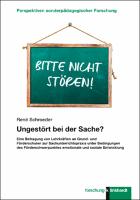Ungestört bei der Sache?
Eine Befragung von Lehrkräften an Grund- und Förderschulen zur Sachunterrichtspraxis unter Bedingungen des Förderschwerpunktes emotionale und soziale Entwicklung
Abstract
The assumption social studies and science in primary education to be a key-component in realizing inclusive teaching in primary classrooms for all children but especially for children with emotional and behavioral difficulties in special needs education is fundamental to this work. Nevertheless, there is nearly no research-based evidence on how potentials for inclusion and social learning are used in primary schools or special schools nor is there research on how teaching is planned, realized, and accounted for. This desiderate is addressed in this work. By analyzing and thereby linking the discourses in social studies and science in primary education and special education for children with emotional and behavioral difficulties, principles for education and teaching in both domains are summarized. This is the theoretical foundation of a mixed- methods-study with a two-step-design to explore the teaching practices and teachers’ beliefs of teachers in inclusive primary schools and special schools for children with emotional and behavioral difficulties in North Rhine-Westfalia, Germany. The study is composed of a partly standardized questionnaire survey (n= 80) followed by qualitive interviews with teachers as experts (n = 10). Data is consequently triangulated to explore the structure of teaching practices and possible determinants concerning the teachers, framework conditions and the learning groups. The results indicate that life-world-oriented education, disturbed student-teacher-interactions and professional lesson planning between child, method and teaching materials are important issues for the development of inclusive teaching in social studies and science in primary education. Consequently, the study outlines future fields of research and development derived from an explorative view at teaching practices in inclusive and separative education settings. Ausgangspunkt bildet die Annahme, dass der Sachunterricht, als Kernfach der Primarstufe über seinen Allgemeinbildungsanspruch, der eine vielperspektivische und an der Lebenswelt der Kinder orientierte Sacherschließung beinhaltet, ein besonderes Potenzial sowohl für ein Lernen in inklusiven Lerngruppen wie spezifisch für Schülerinnen und Schüler mit sonderpädagogischem Förderbedarf im Bereich der sozial-emotionalen Entwicklung besitzt. Wie diese Potenziale in der Praxis genutzt werden bzw. wie sich eine diesbezügliche Praxis im Gemeinsamen Unterricht der Grundschule bzw. Förderschule überhaupt gestaltet, stellt jedoch ein umfassendes Desiderat dar, dem sich die vorliegende Arbeit widmet. Als analytische Referenzpunkte werden die bisher weitgehend unverbundenen Bezugsdiskurse der Sachunterrichtsdidaktik sowie der Sonderpädagogik im Förderschwerpunkt emotionale und soziale Entwicklung hinsichtlich ihrer zentralen pädagogisch-didaktischen Leitprinzipien befragt und in Beziehung zueinander gesetzt. Die geschaffene theoretisch-konzeptionelle Grundlagen bildet den Rahmen für eine zweiphasige Mixed-Methods-Studie zur Unterrichtspraxis sowie handlungsleitenden Motiven von Lehrkräften im Gemeinsamen Unterricht sowie an Förderschulen mit dem Förderschwerpunkt emotionale und soziale Entwicklung in Nordrhein- Westfalen. Die Erhebung setzt sich aus einer teilstandardisierte Fragenbogenerhebung (n = 80) sowie nachgelagerten qualitative Experteninterviews (n = 10) zusammen, deren Ergebnisse über eine konsequente Triangulationsstrategie aufeinander bezogen werden, um die sachunterrichtliche Angebotsstruktur sowie damit verknüpfte Einflussfaktoren auf Ebene der Lehrkräfte, der Rahmenbedingungen sowie der Lerngruppen im Vergleich der beiden Beschulungssettings zu explorieren. Die Ergebnisse werfen dabei bedeutsame Frage für die konzeptionelle Weiterentwicklung einer inklusiven Sachunterrichtsdidaktik im Kontext von Lebensweltorientierung, gestörten Lehr-Lern-Interaktionen sowie professionellem Planungshandeln zwischen Kind, Methode und Material auf. Die Untersuchung umreißt hierzu gemäß ihrem explorativen Charakter mögliche zukünftige Entwicklungsfelder.
Keywords
Sachunterricht; Primarbereich; Schulform; Sonderschule; Grundschule; Sonderpädagogischer Förderbedarf; Sonderpädagogik; Affektive Entwicklung; Soziale Entwicklung; Unterrichtsgestaltung; Unterrichtsstörung; Integrative Beschulung; Fachdidaktik; Unterrichtspraxis; Lehrer; Inklusion; Pädagogik; Didaktik; Umfrage; Fragebogenerhebung; Interview; Nordrhein-Westfalen; Deutschland; Instruction in natural science subjects; Primary school science and social studies; Primary education; Primary level; Type of school; School for the handicapped; Special needs school; Special school; Elementary School; Primary school; Primary school lower level; Special Educational Needs; Remedial instruction sciences; Special education for the handicapped; Special needs education; Affective development; Social change; Social development; Specialized didactics; Subject didactics; Teaching practice; Teacher; Inclusion; Pedagogics; Sciences of education; Training method; Questionnaire survey; North Rhine-Westphalia; North-Rhine Westphalia; GermanyDOI
10.35468/5943ISBN
9783781525030, 9783781559431Publisher
Verlag Julius KlinkhardtPublication date and place
Bad Heilbrunn, 2022Grantor
Series
Perspektiven sonderpädagogischer Forschung,Classification
Educational strategies and policy: inclusion
Teaching of students with social, emotional or behavioural difficulties


 Download
Download Web Shop
Web Shop